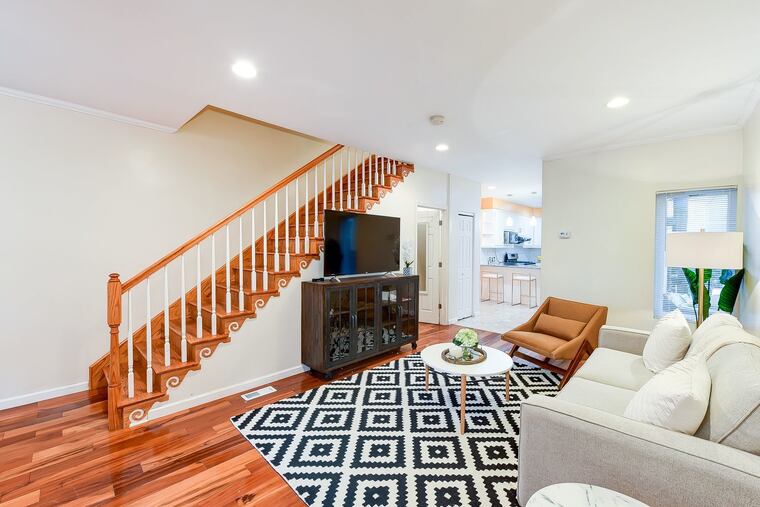New-to-Philly real estate start-up turns rowhouses into mini-‘co-living’ dens
San Francisco-based Bungalow leases private homes from their owners for years at a time so it can rent those dwellings out by the room.

Bungalow, a real estate start-up, has arrived in Philadelphia with a business model that could have been cribbed from MTV’s The Real World, casting young strangers as housemates one city at a time.
The San Francisco-based company, which officially began its Philadelphia operations Thursday, leases private homes from their owners for years at a time so it can rent those dwellings out by the room.
Bungalow chief executive Andrew Collins said the company offers a homier, less costly alternative to the “co-living” projects that are popping up in desirable neighborhoods in Philadelphia and beyond to house those who can’t — or don’t want to — afford a full-blown home of their own.
He compared his approach to that of co-working operators such as WeWork, which manage space that they rent from commercial landlords for sublease to shorter-term office users.
“Folks are fed up at having to put half of their paychecks toward rent,” Collins said this week. “We can really offer a great service where you don’t need to sacrifice to live in amazing neighborhoods.”
Susan Wachter, a real estate professor at the University of Pennsylvania’s Wharton School, said she sees Bungalow’s approach as a modern version of the rental-agent businesses that have long matched tenants with homes.
But by putting large numbers of properties under its direct management and using an online portal to fill each home to capacity, it can operate more efficiently and profitably than a traditional broker, Wachter said.
“It’s different because it’s linking to the internet and the shared economy," she said. “It’s Wall Street taking single-family homes and renting them out as multifamily."
Bungalow started about two years ago and has concentrated largely on markets where high housing costs make home-sharing especially attractive, such as the San Francisco Bay Area, Los Angeles, Boston, New York and Washington, D.C.
It’s beginning in Philadelphia with a portfolio of 13 three-bedroom properties, mostly rowhouses, in Center City and surrounding neighborhoods including Northern Liberties, Bella Vista, and Point Breeze. It plans to more than triple its leases with city homeowners by year’s end.
Rooms in the city range from $650 a month in Point Breeze to $970 a month near Washington Square, according to its website.
Bungalow performs background checks on prospective tenants and outfits homes that it manages with furniture, internet connections, big TVs and other appliances. It also holds citywide gatherings for residents of its properties.
Tenants typically must commit to leases of at least four months but are permitted to transfer into other homes under the company’s management, including ones in other cities, without penalty.
Collins said Bungalow pitches itself to the same base of transient young professionals targeted by operators of co-living apartments, such as those recently announcing projects in Fishtown and Northern Liberties.
But it can house that population more cost effectively, because its approach doesn’t require expensive new construction, he said. As a result, the company has been able to draw conservatively from the $14 million in venture capital it raised last year, fueling its expansion largely with funds from its operations, Collins said.
Bungalow started out renting properties from homeowners with more space than they needed, such as empty-nesters who have downsized into smaller apartments, but now works with a growing contingent of investors who buy houses specifically for his company to lease and manage, he said.
“You have multiple bedrooms that are just sitting there empty, and so it’s underutilized space,” Collins said. “We’re really able to better utilize that space.”
Kevin Gillen, senior research fellow at Drexel University’s Lindy Institute for Urban Innovation, said it’s unclear how the company will fare in Philadelphia, where housing costs are low compared with cities where Bungalow already operates.
Although it could gain a foothold in Center City, where rents really are high, or in such neighborhoods as Fishtown, Northern Liberties and Kensington, which appeal to young singles who might prefer the company of housemates, Gillen said he’s "skeptical that it could succeed on a citywide basis.”
“If housing is affordable, you don’t need to share a unit,” he said. "And, if you’re married, with kids, or just older, then chances are you don’t want to share a dwelling with a bunch of strangers.”
Bungalow also may be limited by Philadelphia’s zoning code, which generally prohibits homes from being shared by more than three occupants who are not related, said Peter Kelsen, a lawyer specializing in land-use law at Blank Rome LP.
While its listings in other cities offer space in houses with as many as nine bedrooms, all of the properties it has under lease in Philadelphia so far are three-bedroom homes.
Bungalow may "have figured out that this number issue could be a problem, " Kelsen said.